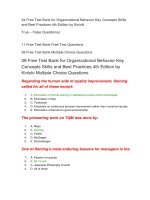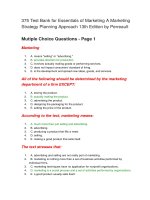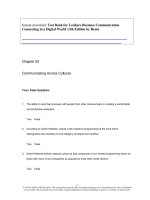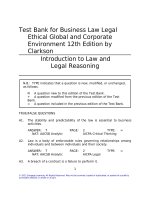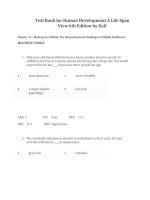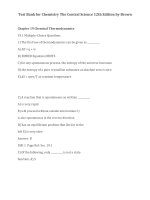Download test bank for the satisfying life positive psychology and personal growth 1th edition by hadad
Bạn đang xem bản rút gọn của tài liệu. Xem và tải ngay bản đầy đủ của tài liệu tại đây (343.74 KB, 9 trang )
Link
TestLife
bank
for The
Satisfying
Life Positive
Test
bank download:
for The Satisfying
Positive
Psychology
and Personal
Growth 1th Edition by Hadad
Psychology and Personal Growth 1th Edition
CLICK HERE
CHAPTER 1
THE SATISFYING LIFE AND HAPPINESS
Multiple Choice
MC 1-1. Alexandra feels that she can only call her day a happy one if she has eaten some dark
chocolate. Alexandra's definition of happiness seems to be:
a. Hedonism
b. Eudaimonia
c. The golden mean
d. Conceptual
Answer: a
Skill Level: Applied
Pg. 4
MC 1-2. The golden mean refers to:
a. Having an average amount of material goods
b. Having enough, but not too much, of what one needs and wants
c. Having enough satisfaction in life to make life seem positive
d. Having a virtuous and committed life
Answer: b
Skill Level: Concept
Pg. 5
MC 1-3. Eudaimonic well-being includes:
a. Pursuing goals that lead to external gain
b. Maximizing external motivation
c. Acting in ways that optimize personal growth
d. Having only positive emotions
Answer: c
Skill Level: Concept
Pg. 6
MC 1-4. Problems with self-reports include:
a. The possibility of a social comparison response
b. The likelihood that many people will give overly complex answers
c. The inability to find correlations within these data
d. The probability that all respondents will not be verbally expressive
Answer: d
Skill Level: Concepts
Pg. 9
MC 1-5. When people give a social desirability response, they are giving a response that:
a. Is in keeping with society's rules of courtesy
b. Makes them look a little better than they really are
c. Allows them to ask for social favours
d. Indicates that they want to join a social group
Answer: b
Skill Level: Concept
Pg. 9
MC 1-6. If we say that a self-report measure has validity, we mean that it:
a. Is used by many other researchers
b. Gives results that agree with the researchers' opinions
c. Has used experience-sampling methods
d. Measures what we think it measures
Answer: d
Skill Level: Concept
Pg. 10
MC 1-7. Measuring happiness may be problematic because:
a. People may have differing definitions of happiness
b. Happiness is not a consistent state
c. Happiness actually consists of many sub-emotions, such as joy, contentment, etc.
d. People are often unwilling to reveal what their emotions are
Answer: a
Skill Level: Concept
Pg. 10
MC 1-8. Katerina had a regular, rather boring day at work, but when she got home at the end of
the day, she found her boyfriend had sent her roses which she loved. By the peak-end rule,
Katerina will probably judge the whole day as having been:
a. Good
b. Boring
c. Both good and bad
d. Ordinary
Answer: a
Skill Level: Applied
Pg. 11
MC 1-9. In general, people's ratings of their subjective well-being depends on:
a. Their age
b. Their ethnicity
c. How well they are achieving what they value
d. Whether they have more material goods than other people do
Answer: c
Skill Level: Concept
Pg. 12
MC 1-10.
a.
b.
c.
d.
The top-down model of subjective well-being suggests that:
We have innate predispositions for happiness
People can become happy if they have material goods and social support
Our happiness is influenced by the well-being of our supervisors and employers
We can be happier if we pay more attention to our friends and family
Answer: a
Skill Level: Concept
Pg. 12
MC 1-11.
a.
b.
c.
d.
The relationship between people's levels of happiness and their life circumstances is:
Large
Small
Non-existent
Unknown
Answer: b
Skill Level: Concept
Pg. 13
MC 1-12. Which of the following statements is true?
a. Identical twins are more similar on measures of well-being than are fraternal twins.
b. People who are prone to having negative emotions have more activation in the left
hemisphere of their brain than in the right hemisphere.
c. The strongest predictor of subjective well-being, income, shows a strong
correlation with happiness.
d. People generally report less happiness as they grow older, as compared to when they
were children.
Answer: a
Skill Level: Concept
Pg. 13
MC 1-13.
a.
b.
c.
d.
According to setpoint theory, if Jenny wins an important competition, she will:
Raise her happiness level for the rest of her life
Experience no more happiness than she usually experiences
Be unhappier later in her life because nothing can match her joy at this moment
Be happier for a while, then drift back to her normal level of happiness
Answer: d
Skill Level: Applied
Pg. 14
MC 1-14. Malukania (a fictional country) has become wealthier since the discovery of malukite
(a fictional rare mineral) in its mountains, but its people seem less satisfied with their lives now
than they were before. This is referred to as:
a. The setpoint theory
b. The paradox of the treadmill
c. The paradox of affluence
d. The hedonic paradox
Answer: c
Skill Level: Applied
Pg. 15
MC 1-15. In general, looking at reported subjective well-being across nations, it is found that:
a. Except for those at the lowest income level, people of all incomes report about the
same level of happiness
b. Moderately rich people are happier than those at middle income levels
c. Except for those at the lowest income level, poor people are happier than very rich
people
d. Income level has no relationship with reported subjective well-being
Answer: a
Skill Level: Concept
Pg. 15
MC 1-16.
a.
b.
c.
d.
The concept of the hedonic treadmill suggests that:
People often run after material goods
People adapt to happiness
The more people pursue happiness, the more it eludes them
People try to keep up with the level of material goods that other people have
Answer: b
Skill Level: Concept
Pg. 16
MC 1-17.
a.
b.
c.
d.
Which of the following people is demonstrating social comparison?
Armand, who wants a better car than his brother has
Bert, who is always happy with whatever he has
Charlie, who has voluntarily given up material luxuries
Dexter, who focuses on what he has rather than what he doesn't have
Answer: a
Skill Level: Applied
PP. 16-17
MC 1-18. Jeanette has been given a large bonus at work in recognition of her dedication and
mastery of her job. Jeanette will be happiest with this bonus if:
a. It means that she can afford to renovate her basement
b. She is already underpaid
c. She feels the bonus is an indication of being appreciated in her workplace
d. The bonus was unexpected and reflects the amount of overtime she has put in
Answer: c
Skill Level: Applied
Pg. 17
MC 1-19.
a.
b.
c.
d.
Children of all ages seem to agree that a major source of happiness for them is:
Achievements
Material goods
Individual freedom
People and pets
Answer: d
Skill Level: Concept
Pg. 18
MC 1-20.
a.
b.
c.
d.
Affective forecasting refers to:
Predicting how we will react emotionally in given situations
Predicting how other people think that we will react in given situations
Predicting whether positive or negative events will occur in our futures
Predicting whether we have the ability to perform given tasks
Answer: a
Skill Level: Concept
Pg. 19
MC 1-21.
a.
b.
c.
d.
In general, people are better at forecasting their emotional reactions to:
Negative events
Positive events
Neutral events
Unusual events
Answer: b
Skill Level: Concept
Pg. 19
MC 1-22.
a.
b.
c.
d.
The concept of immune neglect suggests that people:
Forget how happy they were before a negative event takes place
Disregard their biologically determined level of happiness
Prefer the hedonic to the eudaimonic view of happiness
Overlook their resilience in coping with negative situations
Answer: d
Skill Level: Concept
Pg. 19
MC 1-23.
a.
b.
c.
d.
In general, it can said that happy people:
Have less interest in making new friends because they already have enough
Receive less social support from other people because they don't need it
Are less successful at work because it is less important to them
Are more collaborative in conflict resolution because of their greater social
orientation
Answer: d
Skill Level: Concept
Pg. 20
MC 1-24.
a.
b.
c.
d.
The happiest people in the world are probably those who:
Have a great deal of money
Value external measures of achievements and earn them
Value relationships and social interaction the most
Have little need for external luxuries or external relationships
Answer: c
Skill Level: Concept
PP. 20-21
MC 1-25.
a.
b.
c.
d.
Research indicates that the amount of happiness that is actually enough is:
As much as can be achieved
A moderate level
Dependent on the individual
Unknown; there is a lack of research on this topic
Answer: d
Skill Level: Concept
Pg. 21
True/False
TF 1-1. The eudaimonic approach sees happiness as involving a large number of sensual
pleasures.
Answer: False
Skill Level: Concept
Pg. 5
TF 1-2. One problem with self-reports is the possibility of a social desirability response.
Answer: True
Skill Level: Concept
Pg. 9
TF 1-3. If a psychological test doesn't measure what we think it measures, the test is invalid.
Answer: True
Skill Level: Concept
Pg. 10
TF 1-4. According to the top-down model of subjective well-being, we have innate
predispositions for happiness.
Answer: True
Skill Level: Concept
Pg. 12
TF 1-5. Norma is happy in her job, so it is unlikely that she is happy in other areas of her life.
Answer: False
Skill Level: Applied
Pg. 14
TF 1-6. According to setpoint theory, people have internal mechanisms that keep emotions
balanced.
Answer: True
Skill Level: Concept
Pg. 14
TF 1-7. If you can get the car you want now, you will be happier for the rest of your life.
Answer: False
Skill Level: Applied
Pg. 15
TF 1-8. Selma, who has $6 billion, is probably less happy than Gina, who has $6 million.
Answer: False
Skill Level: Applied
Pg. 16
TF 1-9. If Allan wins a lottery, he will probably think most about the problems that extra money
will bring.
Answer False
Skill Level: Applied
Pg. 19
TF 1-10. The happiest people tend to earn less money than moderately happy people.
Answer: True
Skill Level: Concept
Pg. 20
Short Answer
SA 1-1. What is the difference between the hedonistic definition of happiness and the
eudaimonic definition of happiness?
SA 1-2. What problems may arise in research based on self-reports?
SA 1-3. How does setpoint theory explain why people are not satisfied with what they have?
SA 1-4. What problems might people have in predicting their own happiness?
SA 1-5. What are the positive consequences of being happy?
Essay
E 1-1. Does happiness have a biological component? Give arguments/evidence to support your
answer.
E 1-2. Discuss the relationship between income and happiness.

